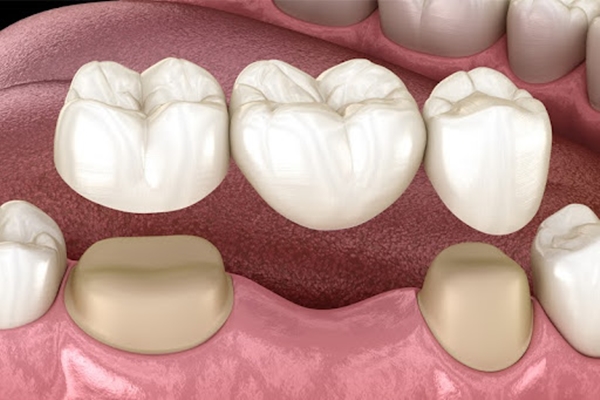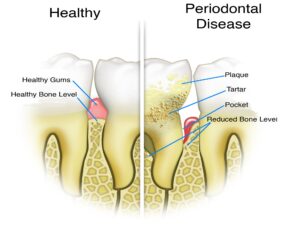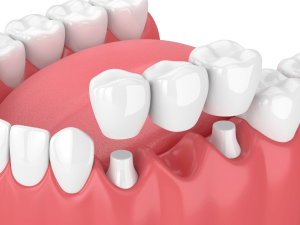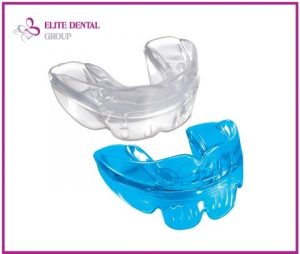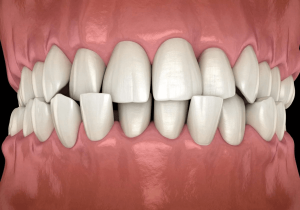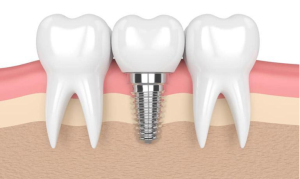Table of content
- 1. What is a dental bridge?
- 2. Is a dental bridge a good option?
- 3. Indications and contraindications for dental bridges
- 4. Types of Dental Bridges
- 5. Dental Bridge Procedure
- 6. Does a Dental Bridge Hurt?
- 7. How Long Does a Dental Bridge Last?
- 8. Where Should I Get a Dental Bridge?
- 9. How to Care for Your Dental Bridge
Dental bridges are one of the most common methods of restoring missing teeth. There are many questions related to this technique, such as: Are dental bridges good? How much do they cost? And what should you pay attention to when getting a dental bridge? Elite Dental will answer these questions in detail in the following article.
1. What is a dental bridge?
A dental bridge is a fixed appliance that replaces one or more missing teeth. It’s like a bridge that spans the gap where your teeth are missing, supported by the teeth on either side. Dental bridges are cemented in place and can’t be taken out.
There are two main types of dental bridges: all-ceramic, which is made entirely of tooth-colored material, and metal-ceramic, which has a metal frame covered with ceramic. Your dentist will help you decide which type is best for you based on factors like where the missing tooth is, how strong it needs to be, and your budget.
2. Is a dental bridge a good option?
The suitability of a dental bridge as a restorative option depends on several factors.
Advantages of dental bridges
- Functional restoration: Dental bridges effectively restore masticatory function, enabling patients to chew and speak comfortably.
- Esthetic appeal: All-ceramic bridges provide a highly aesthetic and natural-looking solution.
- Time-efficient treatment: The fabrication and placement of a dental bridge can be completed within a relatively short timeframe.
- Biocompatibility: Dental bridge materials are generally well-tolerated by oral tissues.
- Cost-effective alternative: Compared to implant-supported prostheses, dental bridges offer a more affordable option.
Disadvantages of dental bridges
- Invasive preparation: The abutment teeth require significant reduction to accommodate the bridge, potentially compromising their long-term health.
- Limited bone preservation: Dental bridges do not stimulate bone regeneration, leading to gradual resorption of the alveolar bone.
Dental bridges represent a reliable treatment modality for the rehabilitation of edentulous spaces. They offer superior function and aesthetics compared to removable prostheses. Nevertheless, the requirement for tooth preparation and the inability to prevent alveolar bone resorption are significant limitations. A comprehensive evaluation is necessary to determine the suitability of dental bridges for individual patients.
View more: Can dental bridges lead to bone loss, and how can it be prevented?
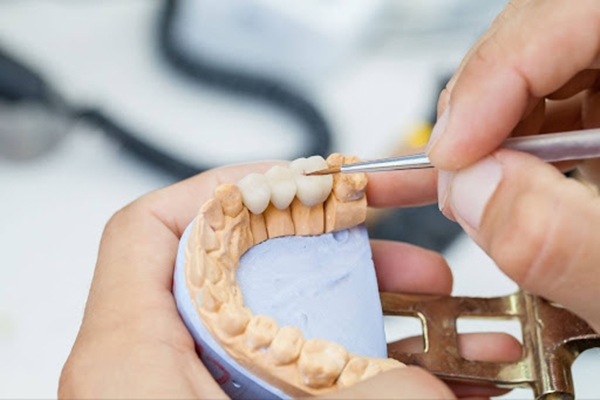
3. Indications and contraindications for dental bridges
Indications
- Patients who desire a fixed prosthetic to replace missing teeth.
- Individuals who are not suitable candidates for implant-supported prostheses.
Contraindications
- Loss of tooth number 7 without a suitable abutment tooth.
- Severe periodontal disease or compromised dental health.
View more: Implant or Other Types of Prosthesis? Which is better?
4. Types of Dental Bridges
With advancements in dental technology, there are now various types of dental bridges available:
4.1. Traditional Dental Bridge
This is the most common type of dental bridge. The two natural teeth adjacent to the gap are prepared to serve as abutments for the bridge.
4.2. Cantilever Bridge
A cantilever bridge uses only one natural tooth as an abutment. This requires careful planning by the dentist to ensure proper force distribution on the bridge.
4.3. Maryland Bridge
A Maryland bridge consists of a pontic (false tooth) attached to metal wings that are bonded to the lingual surfaces of the adjacent teeth.
4.4. Implant-Supported Bridge
This is a more modern technique that involves placing dental implants into the jawbone to support the bridge. This method preserves natural teeth and prevents bone loss.
5. Dental Bridge Procedure
The dental bridge procedure usually involves four appointments (taking about 5-7 business days):
- First appointment: Consultation, X-rays, and examination.
- Second appointment: Preparation of the abutment teeth, taking impressions, and placement of a temporary crown.
- Third appointment: Try-in of the bridge framework and color matching.
- Fourth appointment: Final placement of the bridge.
6. Does a Dental Bridge Hurt?
During the procedure, local anesthesia is used, so you should not feel much discomfort. Afterward, you may experience some sensitivity or mild pain (depending on your individual tolerance). Over-the-counter pain relievers can help alleviate any discomfort.
7. How Long Does a Dental Bridge Last?
Dental bridges are strong and durable, offering good chewing function. They can last for about 7-10 years. However, the lifespan of a dental bridge depends on factors such as oral hygiene, the type of material used (all-ceramic bridges generally last longer than metal-ceramic bridges), and the skill of the dentist.
8. Where Should I Get a Dental Bridge?
Many people recommend choosing a reputable dental clinic with experienced dentists and modern equipment. This ensures a safe and effective dental bridge procedure. In Ho Chi Minh City, you can consider Elite Dental Center. Their team of highly experienced dentists specializes in aesthetic restorative dentistry and is committed to minimally invasive procedures. If you need a dental bridge, you can rest assured that they will provide careful and meticulous treatment. Additionally, Elite Dental stays up-to-date with the latest technology and equipment to ensure a painless and efficient procedure.
View more: Key criteria for Choosing a Reliable Orthodontist
9. How to Care for Your Dental Bridge
A dental bridge can become loose if the surrounding tooth and bone structure become damaged due to dental disease. Just like a dental crown, a dental bridge requires proper oral hygiene to ensure its longevity and durability. Here are some tips for caring for your dental bridge:
- Brush twice daily: Use a soft-bristled toothbrush and fluoride toothpaste, paying special attention to the area where the bridge meets the abutment teeth.
- Floss daily: Floss after every meal to remove food particles and plaque from between your teeth.
- Use mouthwash: Rinse with an antibacterial mouthwash before bed.
- Eat a balanced diet: In the initial stages after getting a dental bridge, stick to soft foods like porridge or soup. Gradually incorporate a diet rich in vitamins and minerals, especially vitamin C and calcium. Remember to stay hydrated by drinking plenty of water.
- Schedule regular dental check-ups: Follow your dentist’s recommended schedule, typically every six months, for professional cleanings and examinations.
Despite the fact that crowns and bridges are capable of staying for a long time, they can sometimes turn loose or even fall out. In order to avoid this problem and lengthen their duration, the most important thing you have to keep in mind is maintaining the best possible oral…
This information will help you better understand how to care for your dental bridge. If you have any further questions, please CONTACT Elite Dental for personalized advice from our dental professionals.
View some related blogs: > How much does it cost to have full dentures? > How long will it take to get completed dentures? > Is getting dentures painful? How to ease that feeling?


